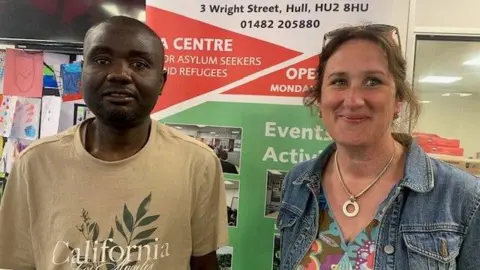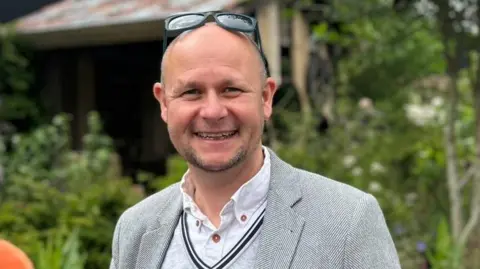Asylum seeker: 'I have years of work in me'
 BBC
BBCAs part of Refugee Week, people in Hull, the scene of rioting and anti-immigration protests 10 months ago, have been learning more about two asylum seekers who have fled Sierra Leone.
From a sunny car park, Francis waves hello to us on his phone screen. Having spent seven months in Hull waiting to hear if he would be granted refugee status, he is now in Scotland preparing an appeal with a lawyer after his claim was refused.
We are on a group call so Francis can speak to Daniel Roche, a director at Roche Civil Engineering in Hull, who wants to understand his story and what refugees can offer businesses in this country.
"Every refugee was an asylum seeker once", Francis adds. "When you make an application for refugee status, you are an asylum seeker. If you get that granted, you become a refugee.
"And can you work when you're a refugee?" asks Daniel.
"Yes, if I get refugee status, I can work," replies Francis.
Daniel says to have people like Francis on his team would solve a big headache in the industry. According to industry website Civil Edge, 225,000 new workers will be needed by 2027.
"All we talk about is a shortage of skilled labour," Daniel explains.
 Submitted
SubmittedAs the pair continue to chat, they discover they have plenty in common. They each have two children, but one difference is that Francis is thousands of miles from his girls after he fled West Africa in fear of his life.
"Back home, I was involved in politics and worked on the elections in 2018. There was some election malpractice and because of saying what I saw, my life was at risk."
Daniel adds: "It's not fair, is it? Because of the hand you were dealt, where you were born, things out of [Francis's] control, he's ended up in the UK, with qualifications that are useable here and he can't work."
After the call, I join trustee Shirley Hart at Welcome House - a community base and support centre for asylum seekers in Hull.
As part of Refugee Week, representatives from the Refugee Council are there to offer advice and people are getting help to fill in forms, one of which is for Hull college, where they can apply for an English course if they have been here for six months.
The aroma of spiced food comes from the kitchen, where volunteers cook a hot meal whenever the centre is open.
It is useful to those who live in shared accommodation, who, according to the government, get £49.17 per week each to cover food, travel and clothes. Those in full board hotels get £8.86 per week.
At Welcome House, we meet Sillah, who says he fled Sierra Leone in fear of his life.
Since arriving in Europe he has been diagnosed with hepatitis C and cirrhosis of the liver. He was living at a hotel in the city until he collapsed in March and had to spend three months in hospital.
In the meantime, his application for refugee status was refused and his hotel place was withdrawn, along with his allowance. His condition is controlled now with medication but doctors are unable to release him until he has somewhere to go.
"I don't want to take up a hospital bed," he says. "But I have nowhere to go. I can't go back [to Sierra Leone].
"My life is in danger and without this medicine, I will collapse again."
Home Office applications
He is talking to Helen, a former Hull primary teacher, who wanted to hear about Sillah's hopes for the future.
"I'm 30 this year. I have many years of work in me and I want to work in care," he says.
According to charity Skills for Care, there are about 131,000 vacant posts in the caring industry.
"When we're getting to know people, we always ask what they do," Shirley adds.
"In one day, we had a vet, a doctor, an ophthalmologist and a civil engineer. I see educated, young men who want to work but can't work because asylum seekers can't work.
"And because of the backlog at the home office... that's why they're in hotels for months and years."
At the end of March 2025, there were 79,000 cases awaiting an initial decision, relating to 110,000 people, but the figures suggest the Home Office is making its way through the backlog.
That number is 9% fewer than the end of March 2024. The number of cases awaiting an initial decision is 41% lower than the peak at the end of June 2023 (134,000 cases).
Helen sighs.
"How lucky are we?" she says.
"Sillah's is just one story. There's a hotel full of people with stories; there's a room full of people here with stories.
"It is our duty to treat other human beings as human beings, not just numbers, cases and problems."
Listen to highlights from Hull and East Yorkshire on BBC Sounds, watch the latest episode of Look North or tell us about a story you think we should be covering here.
